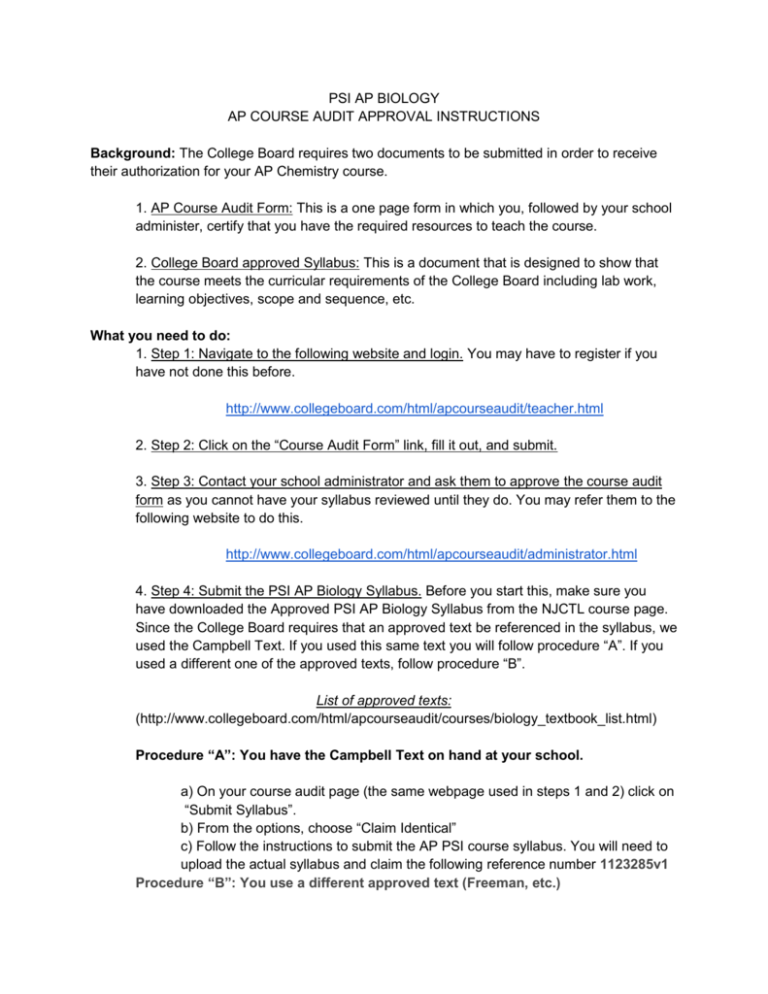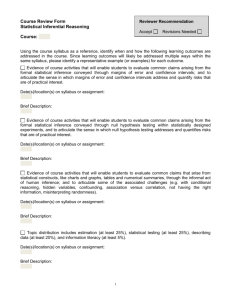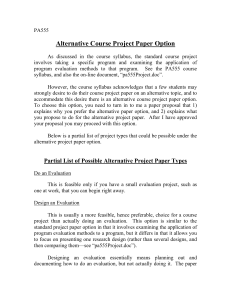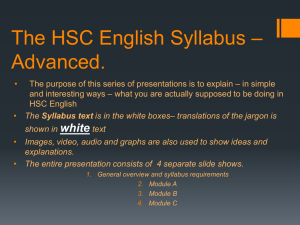PSI AP Chemistry Course Approval Instructions and Laboratory
advertisement

PSI AP BIOLOGY AP COURSE AUDIT APPROVAL INSTRUCTIONS Background: The College Board requires two documents to be submitted in order to receive their authorization for your AP Chemistry course. 1. AP Course Audit Form: This is a one page form in which you, followed by your school administer, certify that you have the required resources to teach the course. 2. College Board approved Syllabus: This is a document that is designed to show that the course meets the curricular requirements of the College Board including lab work, learning objectives, scope and sequence, etc. What you need to do: 1. Step 1: Navigate to the following website and login. You may have to register if you have not done this before. http://www.collegeboard.com/html/apcourseaudit/teacher.html 2. Step 2: Click on the “Course Audit Form” link, fill it out, and submit. 3. Step 3: Contact your school administrator and ask them to approve the course audit form as you cannot have your syllabus reviewed until they do. You may refer them to the following website to do this. http://www.collegeboard.com/html/apcourseaudit/administrator.html 4. Step 4: Submit the PSI AP Biology Syllabus. Before you start this, make sure you have downloaded the Approved PSI AP Biology Syllabus from the NJCTL course page. Since the College Board requires that an approved text be referenced in the syllabus, we used the Campbell Text. If you used this same text you will follow procedure “A”. If you used a different one of the approved texts, follow procedure “B”. List of approved texts: (http://www.collegeboard.com/html/apcourseaudit/courses/biology_textbook_list.html) Procedure “A”: You have the Campbell Text on hand at your school. a) On your course audit page (the same webpage used in steps 1 and 2) click on “Submit Syllabus”. b) From the options, choose “Claim Identical” c) Follow the instructions to submit the AP PSI course syllabus. You will need to upload the actual syllabus and claim the following reference number 1123285v1 Procedure “B”: You use a different approved text (Freeman, etc.) a) You will need to make a few changes to the syllabus. First, you must edit the textbook information to correct for the textbook you are using. Second, in the course outline section of the syllabus, you must edit the “Textbook Reference” section to articulate what chapter(s) of your textbook cover the concepts in that unit. b) On your course audit page, click on “Submit Syllabus”. c) From the options, choose “New or Revised Syllabus”. d) Upload the syllabus. PSI Philosophy and the Laboratory: The College Board requires, as part of the syllabus, to commit to specific guidelines regarding student work in the laboratory. For example, they require that a certain minimum amount of time be spent in the laboratory, that detailed laboratory reports must be written, and that students create many of their own procedures via a “guided inquiry” type approach. Although we agree in spirit to College Board’s emphasis on the laboratory, communication, science practices, and inquiry, we at NJCTL want to make sure our students are learning these skills but without the onerous burden of submitting written laboratory reports for each experiment. In addition, we want to continue our practice of assessing the students on their work in class and not on work developed at home in a non-proctored setting. To satisfy the requirements of the College Board, both in spirit and in letter, without the assigning of regular formal laboratory reports, we are developing a suite of resources to accompany each of the thirteen College Board experiments. Each experiment will include: Post-Lab Assessments: Each investigation will have a post-lab quiz and retake designed to assess science practices (including report writing) and the relevant concepts. For the 2014-2015 school year, for each lab we will work to make: 1. Notebook Presentation: A presentation will be available, including formative assessment questions, designed to teach concepts and practices necessary for success in the lab. Also included in this presentation will be a particular focus on a single component of a laboratory report. 2. Laboratory Handout: A document designed to walk students through the traditional or guided inquiry procedure for the lab. Questions and prompts will be included throughout and students will practice their laboratory report component here as well. *Some of the College Board experiments may be modified to make allowance for limitations of school resources. We believe all schools, regardless of budget, should be able to use our resources effectively. **Students must still keep an organized record of all laboratory work per the College Board requirement. This would include their quizzes and laboratory handouts.








